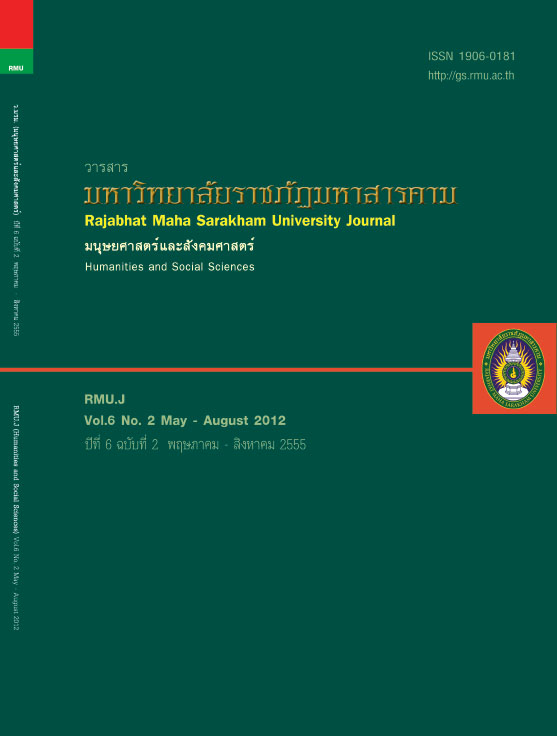โมเดลความสัมพันธ์ของปัจจัยที่มีอิทธิพลต่อความฉลาดทางจริยธรรม ของนักเรียนมัธยมศึกษาตอนต้น จังหวัดมหาสารคาม; The Relationship Model of Factors Influencing Moral Quotients of Junior High School Students in Maha Sarakham Province.
Main Article Content
บทคัดย่อ
การวิจัยครั้งนี้มีวัตถุประสงค์ ประการแรก เพื่อศึกษาความสัมพันธ์ระหว่างปัจจัยที่มีอิทธิพลต่อความฉลาดทางจริยธรรมของ
นักเรียนชั้นมัธยมศึกษาตอนต้น จังหวัดมหาสารคาม ประการที่สอง ตรวจสอบความสอดคล้องของโมเดลความสัมพันธ์ของปัจจัยที่
มีอิทธิพลต่อความฉลาดทางจริยธรรมของนักเรียนชั้นมัธยมศึกษาตอนต้นจังหวัดมหาสารคาม กับข้อมูลเชิงประจักษ์ และประการที่สาม
ศึกษาปัจจัยอิทธิพลทางตรงและทางอ้อมของปัจจัยที่มีอิทธิพลต่อความฉลาดทางจริยธรรมของนักเรียนชั้นมัธยมศึกษาตอนต้น
จังหวัดมหาสารคาม กลุ่มตัวอย่างที่ใช้ในการวิจัยคือ นักเรียนชั้นมัธยมศึกษาตอนต้น จังหวัดมหาสารคาม จำนวน 582 คน โดยการ
สุ่มแบบหลายขั้นตอน เครื่องมือที่ใช้ในการวิจัย คือ แบบวัดความฉลาดทางจริยธรรม แบบวัดการคิดวิเคราะห์ และแบบสอบถาม
ปัจจัยที่มีอิทธิพลต่อความฉลาดทางจริยธรรม การวิเคราะห์ข้อมูลโดยค่าเฉลี่ย ส่วนเบี่ยงเบนมาตรฐาน ค่าสัมประสิทธิ์สหสัมพันธ์แบบ
เพียร์สัน และการวิเคราะห์เส้นทางโดยใช้โปรแกรมสำเร็จรูป ผลการวิจัยพบว่า
1. ปัจจัยที่มีอิทธิพลต่อความฉลาดทางจริยธรรมของนักเรียนชั้นมัธยมศึกษาตอนต้น จังหวัดมหาสารคาม ประกอบด้วย สภาพ
แวดล้อมทางบ้าน สภาพแวดล้อมทางโรงเรียน และ ความสามารถในการคิดวิเคราะห์
2. โมเดลความสัมพันธ์ของปัจจัยที่มีอิทธิพลต่อความฉลาดทางจริยธรรม ของนักเรียนมัธยมศึกษาตอนต้น จังหวัดมหาสารคาม
มีความสอดคล้องกับข้อมูลเชิงประจักษ์ โดยมีค่าสัมประสิทธิ์การพยากรณ์เท่ากับ 0.48 แสดงว่า ตัวแปรทั้งหมดในโมเดลสามารถ
อธิบายความแปรปรวนของตัวแปรความฉลาดทางจริยธรรมได้ร้อยละ 48
3. ปัจจัยที่มีอิทธิพลทางตรงได้แก่ สภาพแวดล้อมทางบ้าน สภาพแวดล้อมทางโรงเรียน และการคิดวิเคราะห์ ปัจจัยที่มีอิทธิพล
ทางตรงและทางอ้อม ได้แก่ สภาพแวดล้อมทางบ้าน สภาพแวดล้อมทางโรงเรียน ปัจจัยที่มีอิทธิพลทางตรงอย่างเดียวได้แก่การคิด
วิเคราะห์
The purposes of this research were to 1) investigate factors influencing moral quotients of junior high
school students in Maha Sarakham Province, 2) validate the relationship model of the factors by examining
its congruence with empirical data, and 3) determine the direct and indirect effects of the factors. The
samples were 582 junior high school students obtained through multi-stage random sampling. The research
instruments were a moral quotients test, an analytical thinking test, and a questionnaire on factors influencing
moral quotients. Data were analyzed by using Mean, Standard Deviation, Pearson’s Product Moment Coefficients,
and Path Analysis. Findings reveal the following :
1. Factors influencing moral quotients of junior high school students in Maha Sarakham Province are
home environments, school environments, and analytical thinking ability
2. The Relationship Model of Factors Influencing Moral Quotients of Lower Secondary School Students
in Maha Sarakham Province is in congruence with the empirical data. The prediction coefficient (R square)
is .48 ; that is, all the causal factors of the model can explain 48 % variance of the dependent variable.
3. The factors directly affecting subjects’ moral quotients are home environments, school environments
and analytical thinking abilities ; the factors directly and indirectly influencing their moral quotients are home
environments and school environments ; while analytical thinking ability is the factor that only affects moral
quotients directly.
Article Details
1. บทความที่ลงตีพิมพ์ทุกเรื่องได้รับการตรวจทางวิชาการโดยผู้ประเมินอิสระ ผู้ทรงคุณวุฒิ (Peer Review) สาขาที่เกี่ยวข้อง อย่างน้อย 3 ท่าน ในรูปแบบ Double blind review
2. ข้อคิดเห็นใด ๆ ของบทความที่ลงตีพิมพ์ในวารสารมหาวิทยาลัยราชภัฏมหาสารคาม นี้เป็นของผู้เขียน คณะผู้จัดทำวารสารไม่จำเป็นต้องเห็นด้วย
3. กองบรรณาธิการวารสารมหาวิทยาลัยราชภัฏมหาสารคาม ไม่สงวนสิทธิ์การคัดลอกแต่ให้อ้างอิงแสดงที่มา


